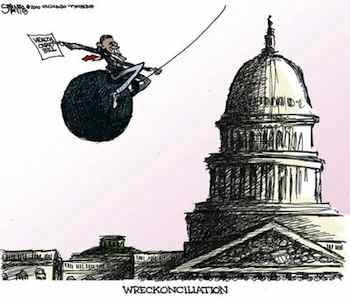- MENU
- HOME
- SEARCH
- WORLD
- MAIN
- AFRICA
- ASIA
- BALKANS
- EUROPE
- LATIN AMERICA
- MIDDLE EAST
- United Kingdom
- United States
- Argentina
- Australia
- Austria
- Benelux
- Brazil
- Canada
- China
- France
- Germany
- Greece
- Hungary
- India
- Indonesia
- Ireland
- Israel
- Italy
- Japan
- Korea
- Mexico
- New Zealand
- Pakistan
- Philippines
- Poland
- Russia
- South Africa
- Spain
- Taiwan
- Turkey
- USA
- BUSINESS
- WEALTH
- STOCKS
- TECH
- HEALTH
- LIFESTYLE
- ENTERTAINMENT
- SPORTS
- RSS
- iHaveNet.com: Politics
by Kenneth T. Walsh

Reconciliation or Wreckonciliation? (© Scott Stantis)
Democrats are trying to convince voters the tactic is fair and justified
It was a clarifying event, but, unfortunately for those seeking bipartisanship, it wasn't a unifying one. Not only did President Obama's daylong healthcare summit illustrate the deep divisions between Democrats and Republicans, but it also showed that healthcare legislation is hanging by a thread.
Obama convened the summit at Blair House as a last-ditch effort to find compromise on the Democrats' proposed
"We all know that this is urgent," President Obama said in opening the proceedings, adding that the healthcare system represents "one of the biggest drags on our economy." House Speaker Nancy Pelosi said, "Inaction and incrementalism are simply unacceptable." The basic Democratic bill is a complex rewrite of existing law designed to extend coverage to 30 million uninsured people. It includes requiring most Americans to get health insurance and provides subsidies for many in the form of tax credits. But Rep. Eric Cantor of Virginia, the second-ranking House Republican, countered, "We have a very difficult gap to bridge here. We just can't afford this." GOP Sen. Lamar Alexander of Tennessee urged taking a series of small steps, such as expanding health savings accounts and altering rules on medical malpractice.
The seven-hour talkathon, was civil but at times sharp-edged. Arizona Sen. John McCain, the 2008
After the summit was over, little had changed. Obama asked the
The administration might try a scaled-back bill or might still push for a comprehensive measure using a
Republicans say using reconciliation to enact a final compromise would be an unfair tactic that would amount to jamming the bill through
But even if they use reconciliation getting a House majority remains a daunting challenge. It is a pattern that has plagued comprehensive healthcare legislation for a half-century. When one obstacle is cleared away, another one always seems to loom ahead.
Available at Amazon.com:
The Political Fix: Changing the Game of American Democracy, from the Grassroots to the White House
AMERICAN POLITICS
WORLD | AFRICA | ASIA | EUROPE | LATIN AMERICA | MIDDLE EAST | UNITED STATES | ECONOMICS | EDUCATION | ENVIRONMENT | FOREIGN POLICY | POLITICS
Receive our political analysis by email by subscribing here
Democrats Threaten Reconciliation After Healthcare Summit | Kenneth T. Walsh
© Tribune Media Services